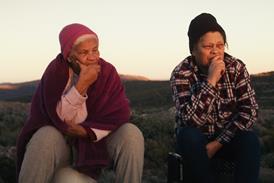Dir: Luigi Falorni & Byambasuren Davaa. Mongolia/Germany. 2003. 90mins.
One of the few buyer talking points at this year's Toronto International Film Festival, The Story Of The Weeping Camel is an illuminating portrait of nomadic shepherds in the Gobi desert which recalls everything from Nanook Of The North to Nikita Mikhalkov's Urga but is from the outset refreshingly unique. Neither strictly a drama nor a documentary, the film goes beyond traditional ethnographical showpiece: its lyrical insight into the basic family ties and co-dependence of parents and children - both among humans and, yes, camels - lend it a magically heartwarming appeal which could easily make it a surprise box office success within the specialised crowd.
As the popularity of Winged Migration and Whale Rider has demonstrated, films which return to nature, tradition and the potential simplicity of existence are proving a tonic to western audiences plagued by the anxieties of contemporary life on a local and global level. A gem like The Story Of The Weeping Camel has all the qualities to melt the hardest heart, and become a cult item for adult and student audiences alike.
Buyers, the most cynical of whom were touched at the Toronto screenings of the film, should be prepared for warm reviews tainted by some media criticism of how it was made. Although it plays as a documentary, it is not one, and much of the action was staged by the two directors, students at Munich Film School whose graduate film it is. Nevertheless, the key events involving the camels are all authentic and actual, and the family of shepherds is real, so documentary purists need not quibble too much.
Italian Falorni and Mongolian Davaa traveled to Mongolia in spring 2002 to capture the occasional phenomenon which Davaa previously knew about whereby mother camels reject their babies after birth and refuse them milk. Local shepherds use an ancient musical ritual to bring the mother and baby back together.
Falorni and Davaa prepared a script outlining this procedure on the assumption that they could chance upon one of the rejections. Sure enough, having identified a multi-generational family with a large camel herd in the Gobi Desert, they did indeed witness and film one of the camels rejecting her newborn after a difficult delivery. The two young boys of the family are dispatched to a distant community to bring a musician to play for the mother who is coaxed by the music to embrace her baby. The music also has the unexplained effect of making the mother weep.
More conventional than the camels is the film's look at the conflict between the nomadic life and the influx of western influences like TV and video games which the two boys encounter on their trip. Indeed, it is the camels' dilemma - and camels have never been so endearing on screen - which is the transcendent heart of this small, spiritually enriching film. When the mother camel begins to weep and allows her helpless baby to start feeding, audiences around the world will be weeping with her.
Prod co: Hochschule fur Fernsehen und Film Munchen in co-production with Bayerishcer Rundfunk, supported by FilmFernsehFonds Bayern
Worldwide sales: Menemsha Entertainment (+ 1 310 712 3720)
Exec prod: Tobias N Siebert
DoP: Luigi Falorni
Ed: Anja Pohl



















No comments yet